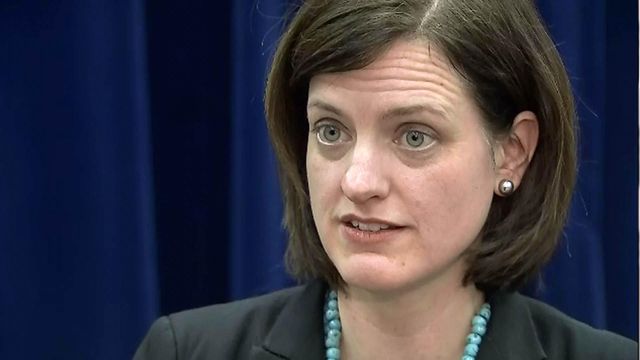Cowell: Money no issue in state bond debate
State Treasurer Janet Cowell says state lawmakers have plenty of room to borrow money for projects this year. The debate will be more about politics than percentages.
Posted — UpdatedThat number came out Monday in this year's Debt Affordability Study, an annual advisory report issued by a commission including Cowell, State Budget Director Lee Roberts and other state financial leaders.
In order to keep its AAA bond rating, the state can't spend more than 4 percent of its overall revenue on debt service each year. Cowell says the state is currently well below that mark. While it's been paying down its outstanding debt, the state has issued little new debt in the six years since the recession began.
With interest rates still at historic lows, Cowell said, this would be a good time to catch up on infrastructure needs.
"Certainly, you’ve got needs building up that will have to be addressed sooner or later, and it is cheaper to do it now than to do it later, assuming that interest rates will rise," she said. "We clearly have some capacity that we could use prudently."
According to the report, the state can afford to borrow about $700 million a year for each of the next five years. That comes out to about $3.5 billion in general fund debt capacity. It can borrow a total of about $1 billion against its Highway Trust Fund over that same period.
"I don’t think that finance is going to be the limiting factor. It’s going to be politics and how much appetite people have for debt," Cowell said.
General fund borrowing capacity is generally used for higher education capital projects, while transportation debt is specifically for transportation uses and is generally leveraged against the Highway Trust Fund, which is largely funded through the gas tax.
"In the past, we have had probably more money and more capacity in the Highway Trust Fund," Cowell said. "Now we’ve got pressure on those bases. So, it’s likely there will be pressure to use some of the general fund money to fund transportation as opposed to using it more heavily toward education."
General obligation debt requires voter approval in North Carolina, as opposed to special-indebtedness borrowing, like certificates of participation, or COPs, which lawmakers can approve without a ballot referendum. Legislators who favor the latter say it can be put to use much more quickly than general obligation debt. However, it costs slightly more and, as Cowell points out, is limited by a recent statute.
"Two years ago, the legislature passed a law stating that the preferred method of debt was general obligation, and that, of outstanding debt, 75 percent should be general obligation debt," she said. "Right now, we’re below that. So, any new debt issuance, if you were to adhere to that and comply with the statute that was passed, it needs to be general obligation – at least predominantly general obligation."
A general obligation bond would have to be placed on the ballot in either the upcoming November election or in the 2016 primary or general election. That would delay the issuance of any bonds until late 2015 at the earliest. The longer the bond takes to win voter approval, the greater the likelihood the interest rate will begin to creep back up.
Timing aside, Cowell says getting the voters to agree to the borrowing will likely be the toughest part.
In 2000, the last time a major bond issue won statewide approval, lawmakers and advocates spent more than year putting together a list of projects that would appeal to the public and then campaigning for its passage. Cowell said a similar effort would be needed for a bond approval this year. But it would have to happen quickly.
"We’ve had six years of anti-debt messaging, and we’ve had no positive build toward a debt issuance, and I don’t think there’s been as much public input. So, that’s the heavier lift this time," she said. "The needs are probably greater for investment, but I just don’t think we’ve had much of a public conversation around it. You have to get over the hurdle of 'debt’s bad' and then build a positive case for, 'Well, how do you want to use it?'”
The treasurer says she's been in conversation with state budget writers, as well as with the business community, most notably the North Carolina Chamber. She says some are concerned that too large a bond could mean less regular funding in the annual state budget.
"They don’t want a bond to be perceived as, ‘Oh, well, we’re done,’" she said. "This is just part of a more comprehensive strategy of funding growth in our state, of funding our infrastructure. But I certainly think that prudent use of low-finance public debt is one piece of that larger puzzle."
Related Topics
• Credits
Copyright 2024 by Capitol Broadcasting Company. All rights reserved. This material may not be published, broadcast, rewritten or redistributed.






